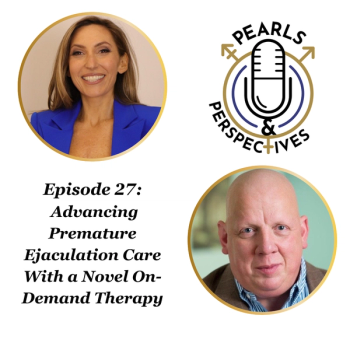
The stigma of depreciating manhood in men with sexual dysfunction
"We should think about a man’s mentality and recognize the impact on his overall physical, mental, emotional health. Sexual function is part of all that wellness, so I would certainly underscore that message we're talking about today," said Arthur L. Burnett, MD, MBA, FACS.
There are many different stigmas associated with sexual dysfunction in men, and these stigmas can affect men both mentally and physically, as they can choose to forego treatment due to embarrassment or anxiety.
In a recent discussion, Urology Times® Assistant Editor Janelle Hart spoke with Arthur L. Burnett, MD, MBA, FACS on this topic. He discusses the psychosocial aspects of sexual dysfunction and what urologists can do to deliver the best care to their patients who may be reluctant to receive treatment. Burnett is a professor of urology and oncology at the Johns Hopkins University School of Medicine, Baltimore, Maryland.
Besides erectile dysfunction, Peyronie's disease, and ejaculatory dysfunction, are there any other men’s health/sexual dysfunction-related conditions that have stigmas attached to them?
The way to think about male sexual dysfunction is to recognize the different elements of the male sexual response cycle. And if we think about sexual interest or a sexual drive, also known as libido, as 1 component of that, then there's arousal and erections and there's the aspect of orgasm and ejaculation. So, I think those are the more conventional ways of thinking about it. With that, then you mentioned a couple things. You mentioned sexual dysfunction, erectile dysfunction, and Peyronie's disease. We also think about these other sides of it. For the male libido aspect, that is related to hypogonadism, and a lot of the time, it could relate to stressors in life—psychological and psychosocial matters. And so, you'll see how that has its association there, and perhaps that has a stigma associated with it as well. Not having an interest in sexual activity; in certain relationships, there's this downside of a partner saying, "Why aren't you interested in being sexually active?" And you can see how that has a connotation on one side. Certainly, on the other side, there’s ejaculatory dysfunction. I'll comment on that because it’s not as common and not considered as much as erectile dysfunction but it does impact relationships as well. There may also be the stigma there of inability to perform to a degree of completion during sexual activity, and that can also antagonize the relationship.
What are some of the stigmas surrounding sexual dysfunction conditions?
Some of the stigmas related to sexual dysfunction conditions have to do with the fact that on the male side, certainly, there’s a sense that men should have sexual prowess, that they should be masculine and functional. If you can't perform with any of these aspects of the male sexual response cycle, then you're less of a man. That's certainly the most significant stigma, the stigma that you're not quite the man that you want to be or what you perceive your partner wants you to be. And so, to me, that's the biggest issue in terms of the stigma of male dysfunction: manhood compromise and that lack of masculinity surrounding sexual dysfunction.
How do stigmas surrounding sexual dysfunction affect treatment?
I think the stigmas affect treatment to the extent that treatments in urology can impact sexual function. On 1 level, we can talk about how treatments for other urologic conditions can lead to ailments in sexual function. There's also a stigma related to getting treated just for sexual dysfunction and circumstances surrounding that. I'm going to take on the first, briefly. I think a good example is prostate cancer management and the thought that a man may lose his manhood with treatments for prostate cancer of any sort. Men have that relationship to the extent that they may wish to not undergo treatment, may not even want to get evaluated or get a screening for prostate cancer for fear they may lose manhood. So, you can see how that has impact there. It’s a major urologic disease state where treatment can impact sexual conscience. And therefore, you can see how the stigma surrounds all of that and there are many other examples of urologic treatments that can affect sexual function. The fear of losing your function could cause a problem when getting properly managed for a gradual urologic condition.
As far as treatments for sexual dysfunction themselves, issues relate to the following questions: Are you less of a man if you need to get psychological counseling? Are you less of a man if you have to take a medication or have to get some sort of treatment that has to allow you to be functional? Surgeons who deal with sexual medicine have many patients who want to keep things quiet, sometimes with partners or even exploring male health clinics without telling their regular physician. Nobody really wants to say, "I'm dealing with this problem and I need to seek treatment." So, you can see there's stigma surrounding just having the problems and seeking treatments along those lines as well.
What is the urologist’s role in destigmatizing sexual dysfunction?
The urologist has a role as almost a physician for men, a male health provider for patients, much like a gynecologist is there for women. And I think that urologists can play a role to bring about the discussion of sexual dysfunction in men. They can play a role in being forthright about how the treatments they are offering may impact function. But you have to be positive minded about the need to be treated. If it's a disease state that can compromise your health and your life, you have to get treated. I think urologists can be very forthright in informing men about the opportunities to still preserve and restore sexual function with the treatments that [are available] at urologic practices. So, I think we have a role here to do that. There's patients who've had cardiovascular disease and they have other medications they are on that may impact sexual function. Urologists can still step in and acknowledge the problem and talk about taking proactive steps to manage sexual dysfunction. Urologists have that role to be a supporter for these patients.
Is there anything else you feel our audience should know about this topic?
I think that it's been certainly the hallmark of my career to be focused on preserving sexual health and promoting sexual health, wellness and wholeness. That should remain our goal, even as we think in a very focused way about different conditions we're retreating. We should think about a man’s mentality and recognize the impact on his overall physical, mental, emotional health. Sexual function is part of all that wellness, so I would certainly underscore that message we're talking about today.
Newsletter
Stay current with the latest urology news and practice-changing insights — sign up now for the essential updates every urologist needs.






